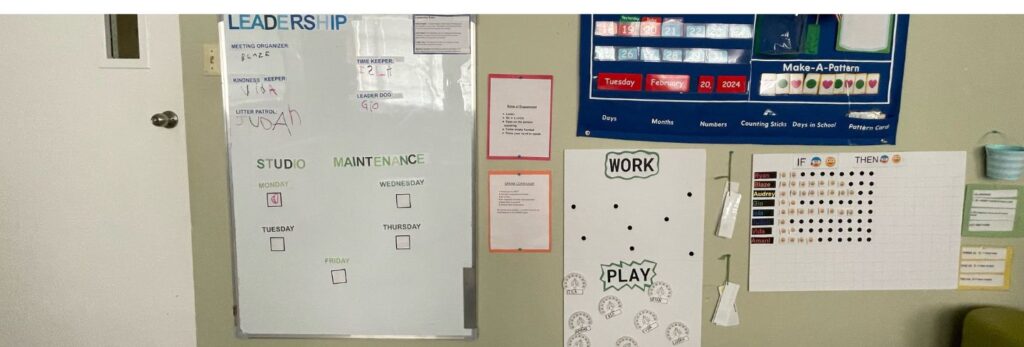If your child has thrived at a Montessori-style preschool, you might be confused at what comes next. There are so many elementary school options but it’s hard to know who shares those same values that have served your student so well.
Today, let’s compare Montessori schools with Apollo Academy. I think you’ll see why it’s a natural next step for Montessori preschool graduates.
The Montessori approach has been a beloved preschool philosophy by South Tampa parents for decades. This alternative approach to preschool continues to be sought - just look at the waitlists on all four of our local Montessori schools! If you have been one of the lucky families to snag a spot at any of these amazing Montessori schools, then you probably have seen a huge difference in your preschooler’s independence, maturity and confidence since joining. So how do you transition your learner from an environment with so many freedoms to a traditional school when he/she starts primary school? Jeff Sandefer, founder of Acton Academy in Austin Texas, explains it best in his Tedx Talk. If you don’t have 18 minutes to listen to the entire talk, then at least listen to his experience as a father navigating the next step for his sons who were already thriving in a Montessori school (minute 2:45-3:45).
So what’s next? As outlined in a previous blog, the South Tampa private schools are mostly religious traditional schools. This may be great for some learners, but I started Apollo Academy because we need a different option in South Tampa, especially for the hundreds of families who are already seeking out alternatives to traditional education for preschool by sending their children to Montessori.
You have already seen how a child-centered approach to learning impacts your child. You see this when your preschooler…
- Independently comes up with creative ways to solve problems
- Is fully present to take in the wonders of the world
- Shows empathy for a friend or sibling who is having a tough day
- Leads neighbor friends through an imaginary adventure in the backyard
We see these impacts in our children and we want them to continue as they grow. Creativity, independence and initiative matter MORE as our children get older.
And that is why Apollo Academy is the perfect next step for Montessori families.
Montessori preschool and Apollo Academy share similar foundations. Here are five values from Montessori that we share at Apollo Academy, but are unlikely to be found at a traditional school:
Respect for children as unique individuals: The core of the Montessori philosophy revolves around a cherished respect for each child as an individual with unique gifts. This goes far beyond personality or physical traits, but encompasses how a child learns and explores her/her environment at his/her own pace.
Similarly at Apollo, we believe every child is a genius on a hero’s journey to discover their calling that will change the world. We treat learners with as much respect as we treat adults, providing them the tools and environments to explore who they are and discover their calling. We believe children are far more capable than we think and everything we do puts the learner at the center of our decisions.
However, often in traditional school, the classroom moves at an average pace and all students are expected to learn the same concepts in the same way.
Freedom within limits in a learner-driven model: Montessori schools are designed so that children are encouraged to learn and do for themselves. They are free to learn at their will and explore what seems most interesting to them at that particular time. The classroom is very fluid with no one right way to use a tool.
Aligning with the Montessori approach, Apollo is an affiliate of Acton Academy, a learner-driven school, which means our learners are in control of their education, environment and ultimately, destiny. While we have systems and processes that create safety guardrails, our learners are in charge. Learners are expected to handle conflict, set weekly and daily goals and achieve mastery of a concept before moving on. In addition, we celebrate failures and mistakes as part of the learning process, with an emphasis on learning from them and then using our failures as stepping blocks to try again.
Conversely, traditional school usually places most of the power in the hands of teachers who set the tone, pace and approach to learning. When there is conflict, a teacher is often notified and expected to resolve disputes. Failures or mistakes usually result in red ink, poor grades or worst case, falling behind.
Multi-age classroom: One of the most widely known aspects of a Montessori classroom is the mixed-age approach. Most of the time there are children spanning several years within the same class which allows children to explore their social curiosities of leading, following and collaborating with peers. The “teachers” are viewed as guides, following the children who are leading their learning.
Like Montessori, at Apollo, learners share one studio for all elementary grades for the same reasons as Montessori. We ask our learners to review each other’s work, provide constructive feedback and collaborate on projects. We also have Socratic guides, not teachers, who ensure safety of the environment and strictly follow the Socratic method.
However, traditional schools are segmented by grade, so children are rarely with siblings or with children of other ages. These single-aged classrooms are led by a traditional teacher who lectures, grades all of the work and is in control of most decisions made in the classroom.
Building a strong sense of community: Children, guides and parents create the network in a Montessori environment that is supportive and encouraging. Oftentimes, a child will be in a classroom with the same Montessori teacher and fellow students for multiple years which allows them to develop a strong bond and sense of community.
Mirroring the approach of Montessori, at Apollo Academy, we don’t admit a learner to enroll with us, but instead we invite a family to join us and embark on their own hero’s journey alongside us. We respect the relationship between the learner and parent just as much as the learner and guide. We include our families in milestone celebrations and public exhibitions.
In a traditional school, while there usually is some sense of community among parents, your student will be enrolled in the school and change teachers each year. Changing teachers each year is oftentimes viewed as a positive in traditional school because the teachers hold so much power. There may be a personality conflict or difference in learning styles among students and teachers, so getting a fresh start each year is usually appreciated in traditional schools. At Apollo, because we have guides and not teachers in a learner-driven environment, the guide is not nearly as important to the success of the learner who has control over his/her education.
Growth of the whole child: Montessori takes a holistic approach to the student, ensuring that the environment is supporting development of all aspects: cognitive, social, physical, and emotional.
Just like Montessori, at Apollo, we learn to learn, learn to do and learn to be. Our badge system expands beyond mastery of intellectual concepts and allows learners to celebrate accomplishments that are focused on character-building and other soft skill accomplishments. This keeps the focus on the entire learner’s well-being, ensuring our learners are creating good habits such as being a good friend, having self-awareness and giving self-love.
However, while most traditional schools in South Tampa have a religious or spiritual component to the development of the student, there is so much curriculum to teach that it leaves little time for non-traditional development.
There you have it - five values that you’ll find in both Montessori preschools and Apollo Academy.
We’re currently looking for founding families to build our community when Apollo Academy opens its doors in August 2022. If your family shares these values and wants to see that creativity, maturity and confidence continue to grow, we’d love to get to know you. Schedule an intro call here. To learn more about Apollo Academy, check out our resources here.
We’re so excited to bring this innovative and modern approach to education to South Tampa for elementary-aged learners!


